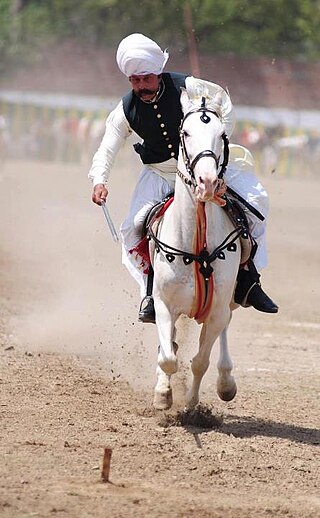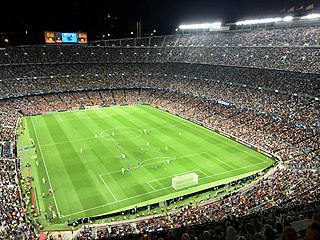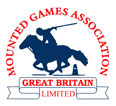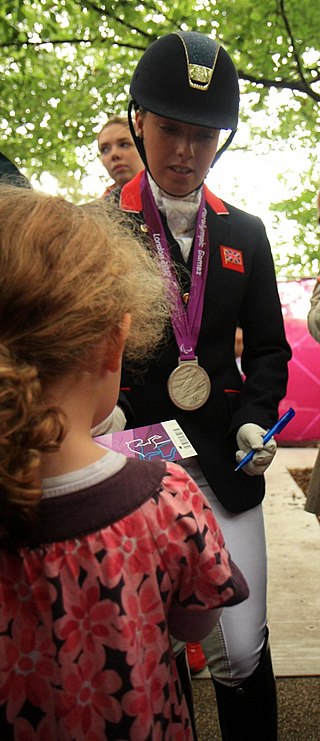
Polo is a ball game that is played on horseback, a traditional field sport and one of the world's oldest known team sports. The game is played by two opposing teams with the objective of scoring using a long-handled wooden mallet to hit a small hard ball through the opposing team's goal. Each team has four mounted riders, and the game usually lasts one to two hours, divided into periods called chukkas or chukkers.

Equestrianism, commonly known as horse riding or horseback riding, includes the disciplines of riding, driving, and vaulting. This broad description includes the use of horses for practical working purposes, transportation, recreational activities, artistic or cultural exercises, and competitive sport.

A horse show is a judged exhibition of horses and ponies. Many different horse breeds and equestrian disciplines hold competitions worldwide, from local to the international levels. Most horse shows run from one to three days, sometimes longer for major, all-breed events or national and international championships in a given discipline or breed. Most shows consist of a series of different performances, called classes, wherein a group of horses with similar training or characteristics compete against one another for awards and, often, prize money.
Home Nations is a collective term with one of two meanings depending on context. Politically it means the nations of the constituent countries of the United Kingdom. In sport, if a sport is governed by a council representing the island of Ireland, such as the Irish Rugby Football Union (IRFU), the term can refer to the nations of the constituent countries on the island of Great Britain and the island of Ireland as a whole.

British Cycling is the main national governing body for cycle sport in Great Britain. It administers most competitive cycling in Great Britain, the Channel Islands and the Isle of Man. It represents Britain at the world body, the Union Cycliste Internationale (UCI) and selects national teams, including the Great Britain (GB) Cycling Team for races in Britain and abroad. As of 2020, it has a total membership of 165,000.
Association football is organised on a separate basis in each of the four constituent countries that make up the United Kingdom (UK), with each having a national football association responsible for the overall management of football within their respective country. There is no United Kingdom national football team. Football has been the most popular sport in the UK since the 1860s. Rugby union, rugby league and cricket are other popular sports.

Sport in the United Kingdom plays an important role in British culture and the United Kingdom has played a significant role in the organisation and spread of sporting culture globally. In the infancy of many organised sports, the Home Nations were heavily involved in setting out the formal rules of many sports and formed among the earliest separate governing bodies, national teams and domestic league competitions. After 1922, some sports formed separate bodies for Northern Ireland, though many continued to be organised on an all-Ireland basis. For this reason, in many though not all sports, most domestic and international sport is carried on a Home Nations basis, and England, Wales, Scotland and Ireland are recognised as national entities.

The United Kingdom national football team are a football team that represents the United Kingdom. Despite football being the most popular sport in the country, the team has not played since 1965 as separate teams represent each home nation in all major international football tournaments such as the FIFA World Cup and UEFA European Championship, as well as various friendlies. It is the home nations which are FIFA affiliated and not the United Kingdom as a whole.

Karen Lende O'Connor is an American equestrian who competes in three-day eventing. Although she did not come from a family of equestrians, her interest in horses started at an early age, and she received her first horse for her 11th birthday. O'Connor began competing internationally in the late 1970s, and in 1986 began riding for the US national eventing team. Since then, she had ridden in five Olympic Games, three World Equestrian Games and two Pan-American Games, winning multiple medals, including a team silver at the 1996 Olympic Games and a team bronze at the 2000 Olympic Games. She has also posted numerous wins and top-10 finishes at other international events. As of 2013, O'Connor is not competing, having suffered fractures to two thoracic vertebrae during a fall at a competition in October 2012.

Tent pegging is a cavalry sport of ancient origin, and is one of only ten equestrian disciplines officially recognised by the International Equestrian Federation. Used narrowly, the term refers to a specific mounted game with ground targets. More broadly, it refers to the entire class of mounted cavalry games involving pointed and edged weapons on horseback, for which the term "equestrian skill-at-arms" is also used.

Nicholas David Skelton is a British former equestrian who competed in show jumping. He retired at the age of 59 years old, on 5 April 2017. He began riding at age 18 months and in 1975 took two team silvers and an individual gold at the Junior European Championships.

The Pony Club Association of New South Wales is the controlling body for Pony Clubs in New South Wales (NSW) where young people can ride and learn all disciplines of equestrian sports. The Association co-ordinates, develops and promotes Pony Clubs in New South Wales and instruction for its members.

Sport in Europe tends to be highly organized with many sports having professional leagues. The origins of many of the world's most popular sports today lie in the codification of many traditional games, especially in the United Kingdom. However, a paradoxical feature of European sport is the extent to which local, regional and national variations continue to exist, and even in some instances to predominate.

The Pony Club is a voluntary organisation founded in England in 1929. It has now expanded internationally and Pony Club branches can be found worldwide. It is one of 16 organisations that form the British Equestrian Federation.

Gymkhana is an equestrian event consisting of speed pattern racing and timed games for riders on horses. These events often emphasize children's participation and may be organized by a recognized Pony Club or a 4-H club. In parts of the western United States, this type of competition is usually called an "O-Mok-See" competition, a term derived from a Native American phrase said to mean "games on horseback". Very small events with little or no prize money, designed for beginners or riders at a local level, are sometimes called playdays. "Gymkhana" is the word used in most of the rest of the English-speaking world, including the United Kingdom and both the East Coast and the West Coast of the United States.

Mountain and moorland ponies form a group of several breeds of ponies and small horses native to the British Isles. Many of these breeds are derived from semi-feral ponies kept on moorland or heathland, and some of them still live in this way, as well as being kept as fully domesticated horses for riding, driving, and other draught work, or for horse showing.

Pony Club Australia Ltd is a not for profit organisation that encourages people to ride and teaches them horsemanship and how to care for horses.

The Mounted Games Association of Great Britain is the governing body for mounted games in Great Britain. It was formed to allow riders to compete in mounted games past The Pony Club upper age limit of 14 years old. The association is one of the 16 organisations which form part of the British Equestrian Federation.

Nicola Wilson is a British equestrian rider specialising in three-day eventing. Riding Opposition Buzz, she won a team gold at the 2010 FEI World Equestrian Games and team silver at the 2012 Olympic Games. She is also a seven-time medallist at the European Championships, including team golds in 2009, 2017 and 2021 and individual gold and bronze in 2021 and 2017, respectively.

Sophie Wells is a British para-equestrian who won three medals at the 2012 Summer Paralympics, and 2 Golds and 1 Silver at the 2016 Rio Paralympics, and most recently Team Gold & Individual Silver at the 2020 Tokyo Paralympics.
















